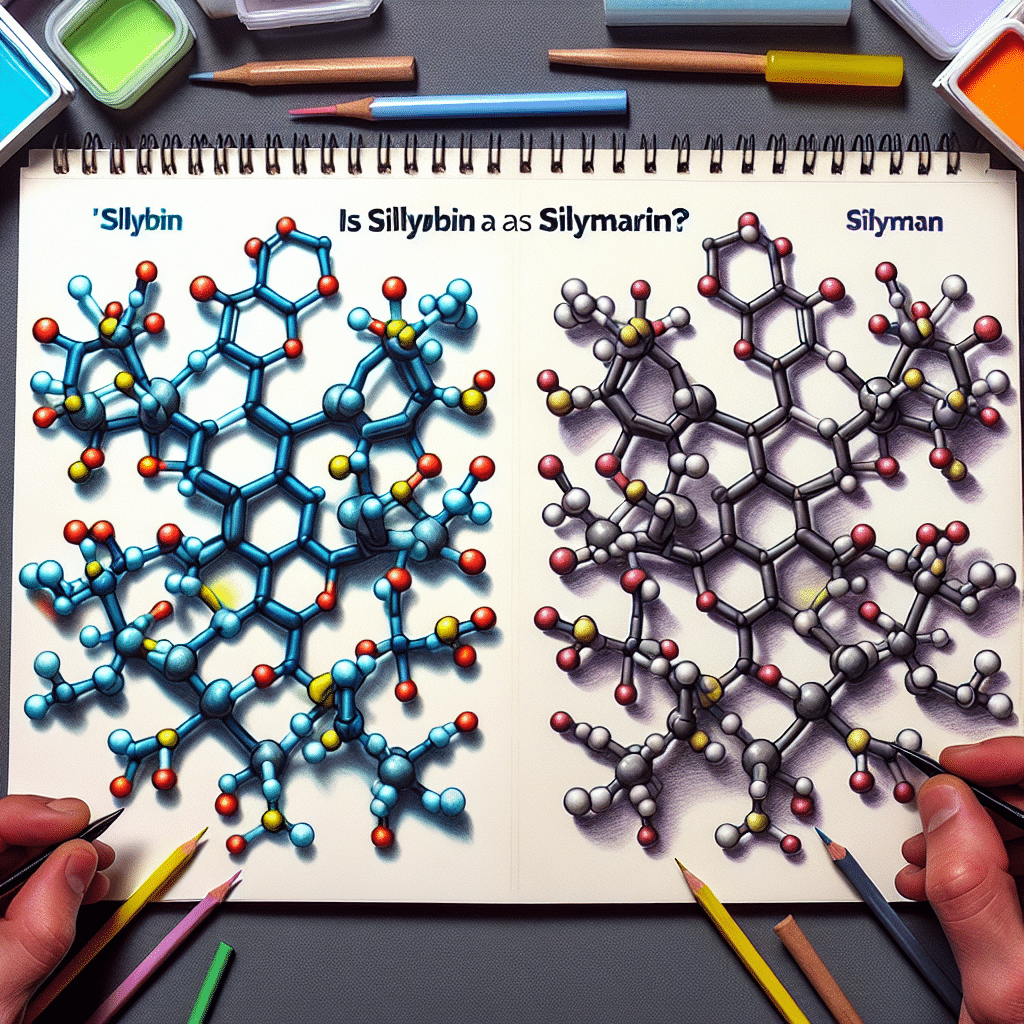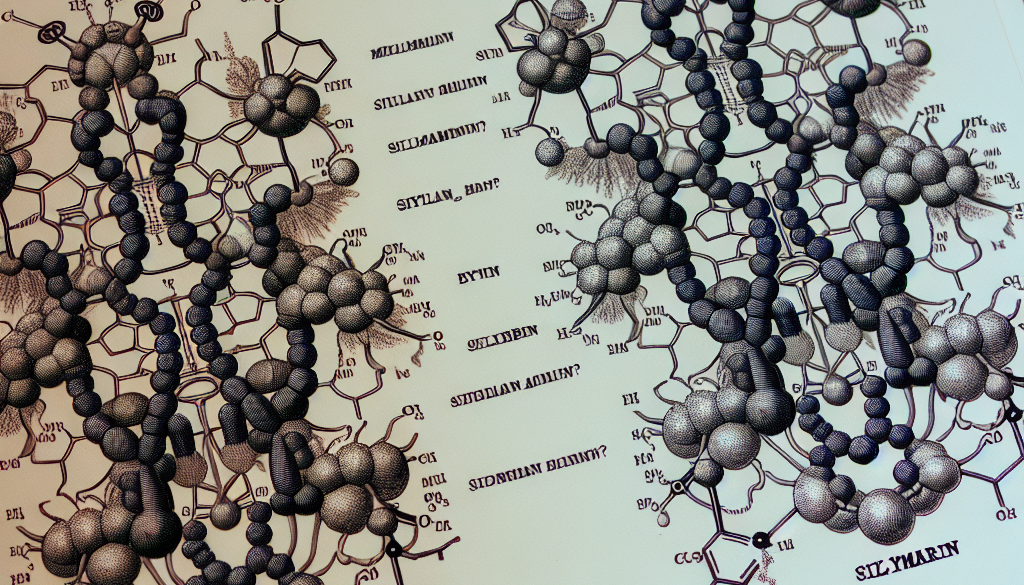Is Silybin the Same as Silymarin?
-
Table of Contents
Silybin vs. Silymarin: Understanding the Liver-Protective Powerhouses

When it comes to liver health, two terms often emerge in discussions among healthcare professionals and researchers: silybin and silymarin. While they may sound similar and are related, they are not the same. This article delves into the distinctions between silybin and silymarin, their benefits, and their roles in liver health and beyond.
What is Silymarin?
Silymarin is a flavonolignan complex extracted from the milk thistle plant (Silybum marianum), which has been used for centuries as a natural remedy for liver disorders. It is composed of several compounds, including silybin, isosilybin, silychristin, silydianin, and others. Silymarin is widely recognized for its antioxidant, anti-inflammatory, and hepatoprotective properties, making it a popular supplement for supporting liver health.
What is Silybin?
Silybin, also known as silibinin, is the most active and abundant component of the silymarin complex. It accounts for approximately 50-70% of the total silymarin content and is considered the primary compound responsible for the therapeutic effects attributed to milk thistle. Silybin is often isolated for use in more concentrated supplements and research studies due to its potent liver-protective capabilities.
Comparing Silybin and Silymarin
Understanding the differences between silybin and silymarin is crucial for anyone considering these supplements for liver support or other health benefits. Here’s a closer look at how they compare:
- Composition: Silymarin is a complex containing multiple compounds, while silybin is a single, specific compound within that complex.
- Concentration: Silybin is the most concentrated active ingredient in silymarin, often extracted for its high potency.
- Availability: Silymarin is more commonly found in over-the-counter supplements, whereas silybin may be available in specialized formulations or used in clinical research.
- Research Focus: While both silybin and silymarin have been studied, silybin often takes center stage in research due to its significant contribution to silymarin’s effects.
Benefits of Silymarin and Silybin
Both silymarin and silybin have been associated with numerous health benefits, particularly concerning liver health. Here are some of the key benefits supported by scientific research:
- Antioxidant Activity: They protect liver cells from oxidative stress by scavenging free radicals.
- Anti-inflammatory Effects: They reduce inflammation in the liver, which is crucial for preventing and managing liver diseases.
- Hepatoprotective Properties: They help protect liver cells from toxins and support the regeneration of damaged liver tissue.
- Anti-fibrotic Actions: They may help prevent the progression of liver fibrosis, a condition where excessive connective tissue builds up in the liver.
While both silymarin and silybin offer these benefits, silybin’s higher potency may make it more effective in certain applications. However, the other components of silymarin also contribute to its overall therapeutic potential.
Case Studies and Research
Several studies have highlighted the effectiveness of silymarin and silybin in treating liver conditions. For instance, research has shown that silymarin can help improve liver function in patients with alcoholic liver disease. Similarly, silybin has been studied for its potential to treat liver diseases such as hepatitis and cirrhosis, often showing promising results.
Moreover, a study on silybin-phosphatidylcholine complexed as a phytosome demonstrated improved bioavailability and efficacy in treating liver disorders compared to standard silybin. This suggests that while silybin is potent, its formulation can significantly impact its therapeutic benefits.
Conclusion: Key Takeaways on Silybin and Silymarin
In summary, while silybin and silymarin are closely related, they are not the same. Silymarin is a complex of compounds with silybin as its most active ingredient. Both offer significant liver-protective benefits, but silybin’s higher potency often makes it the focus of more concentrated supplements and research. When considering a supplement for liver health, it’s essential to understand the differences between these two compounds to make an informed decision.
Discover ETchem’s Protein Products
If you’re looking for high-quality protein products to complement your health regimen, consider exploring ETchem’s offerings. Their extensive range of collagen products, including marine, fish, bovine, chicken, and various types of collagen, are designed to meet diverse industry needs. With a focus on quality and customer satisfaction, ETchem is a trusted supplier for businesses and consumers alike.
About ETChem:
ETChem, a reputable Chinese Collagen factory manufacturer and supplier, is renowned for producing, stocking, exporting, and delivering the highest quality collagens. They include marine collagen, fish collagen, bovine collagen, chicken collagen, type I collagen, type II collagen and type III collagen etc. Their offerings, characterized by a neutral taste, instant solubility attributes, cater to a diverse range of industries. They serve nutraceutical, pharmaceutical, cosmeceutical, veterinary, as well as food and beverage finished product distributors, traders, and manufacturers across Europe, USA, Canada, Australia, Thailand, Japan, Korea, Brazil, and Chile, among others.
ETChem specialization includes exporting and delivering tailor-made collagen powder and finished collagen nutritional supplements. Their extensive product range covers sectors like Food and Beverage, Sports Nutrition, Weight Management, Dietary Supplements, Health and Wellness Products, ensuring comprehensive solutions to meet all your protein needs.
As a trusted company by leading global food and beverage brands and Fortune 500 companies, ETChem reinforces China’s reputation in the global arena. For more information or to sample their products, please contact them and email karen(at)et-chem.com today.




